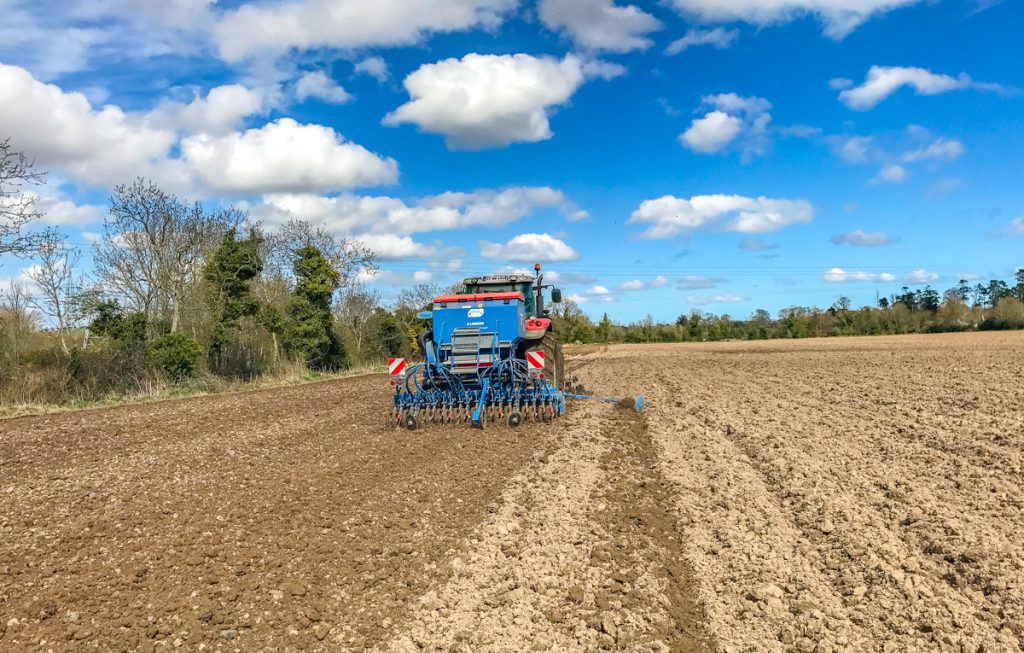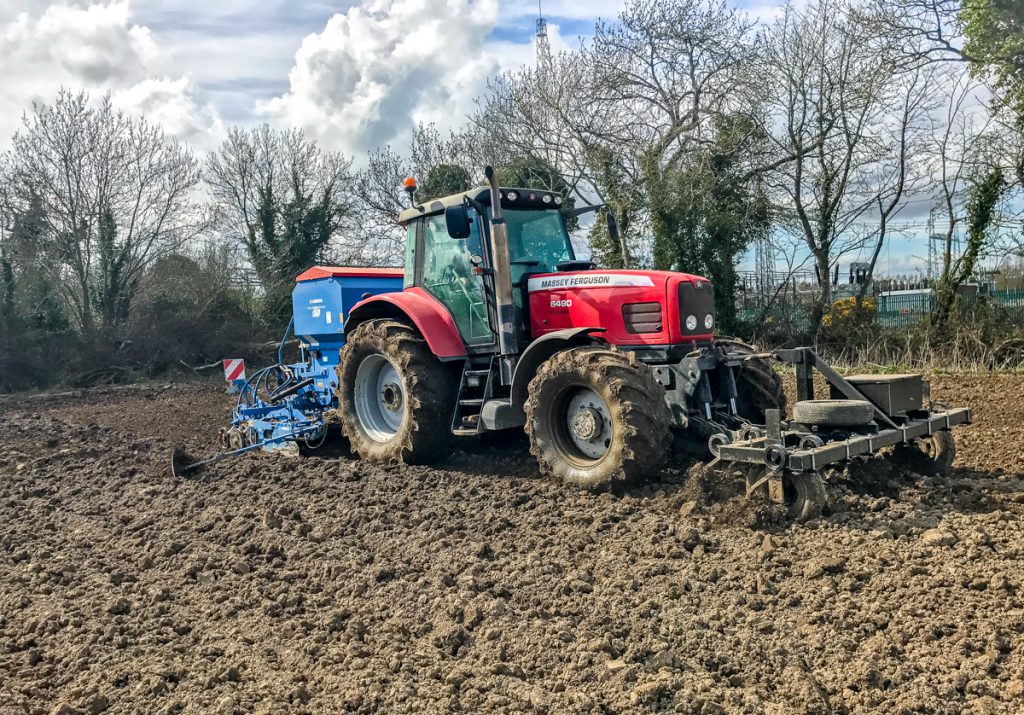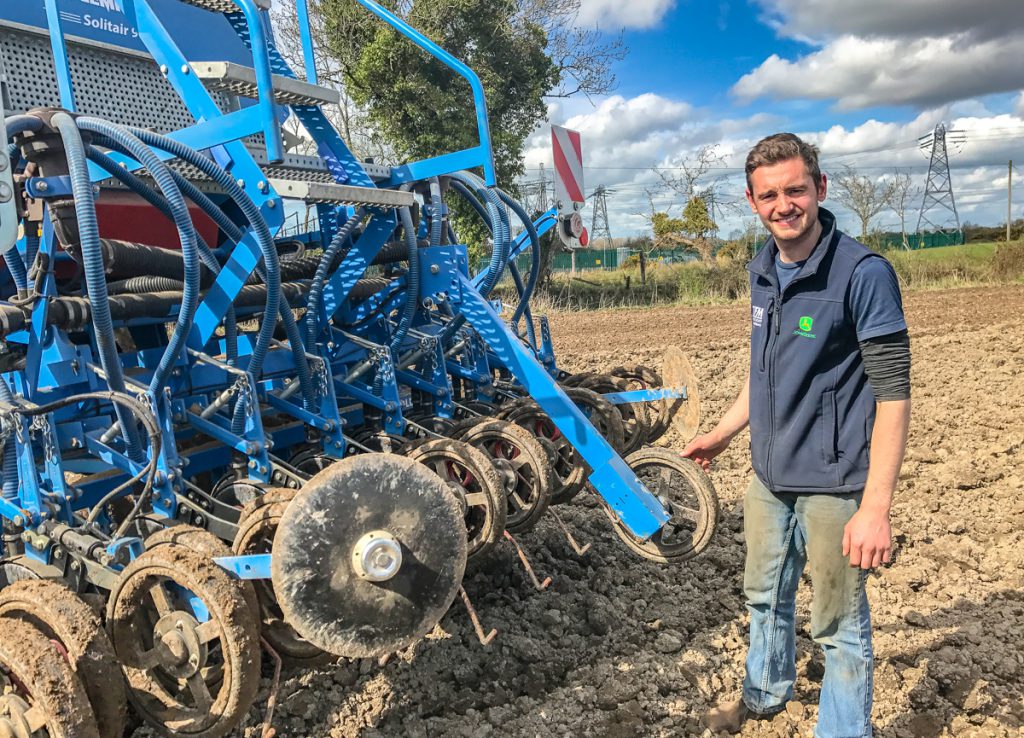Mark Daynes ventured out to the ploughed fields on Thursday last in another attempt to get some spring barley sown.
The young farmer is on the the border of counties Kildare and Wicklow. He was sowing at Dunnstown, just outside Kilcullen, when AgriLand caught up with him.
Mark began farming full time last May when he finished studying at Waterford Institute of Technology (WIT). Together with his father, they grow a range of crops, including: winter wheat; winter barley; winter oats; spring beans; spring oilseed rape; and spring barley. The family also run a contracting business.
As temperatures soared across the country, Mark was back out sowing spring feed barley last week. He was happy to be using his new Lemken Solitair 9 drill, which he purchased this season.
Mickle was the variety of choice for this particular field. He explained: “I sowed it two years ago and it was the only variety to stand up to drought around the home farm.
We also have Planet, Irina and Gangway. We supply to a few different merchants – Quinns, Liffey Mills and Wynnes.
Mark is careful when choosing varieties, adding: “I look at the resistance. Varieties need to have high disease resistance. Personal experience is very important. If we get on well, we’re more inclined to use that variety again.”
Home-saved seed
He said: “We usually keep most of our own seed and buy in enough to have new seed coming into the farm. We couldn’t get any grain below 25% moisture content last harvest, so we didn’t get to save any seed.”
Mark thinks that home-saved seed works out a lot cheaper than buying from a merchant, adding: “It’s €100/t cheaper. We usually sow at a heavier rate with our own seed – 13st/ac. We’re putting this (purchased seed) in at 12st/ac. The big reason we do it is to control weeds.”
Sowing so far
On sowing, he said: “When I finish this block, we’ll have about 210ac of spring crops sown. We have beans in and we sowed oilseed rape last night.
“We sowed the beans at the end of February, just before the snow. They didn’t make an appearance until about a fortnight ago. They’re not looking too bad. We ploughed it and sowed them straight after.”
The beans were the first crop to be sown with the new drill.
“There were a few little teething problems just because we haven’t had a Lemken drill before and we weren’t sure how to use it. But we had TFM (Templetuohy Farm Machinery) and Lemken out to help us set it up. They were more than obliging. It’s a great machine.
I was looking at the Solitair 8; but I wanted the electric metering system and the bigger hopper and discs, so we bought the Solitair 9.
“The grubber has done a good job ahead of the sower. This drill is half a tonne heavier than the old one and it also holds one tonne more than the old drill. With this, we’ve added additional weights on the front of the tractor.
“We usually run a 4m furrow press behind the tractor. We’ve two ploughs, the furrow press and then the one-pass.”
Minimum-tillage and organic manure
Mark is going to demonstrate some zero-till drills next autumn.
“In January next year, we’re looking at buying a zero-till machine. We’re looking at moving that way. We’ve been introducing cover crops for the last few years, so that’s the game plan. We have about 75ac of min-till at home this year.”
In the past few years, cover crops and organic manure have become a big part of the farm’s soil management.
On cover crops, he said: “We put in a lot of oats; we just broadcast the seed out and disc it in. We had it sowed in early September; but the phacelia and vetch didn’t go in until about September 26.
“We sprayed the cover crops off; they were on the min-till ground. The oats was ploughed in. We put out a lot of organic manure. My father drew 200t of cattle dung to the farm yesterday. We’ve reduced our usage.
“In other years we used about 500t in the spring. But we did our calculations the other day and what we’re paying for it isn’t worth it, so we reduced the intake and the application rate. We’re covering the same amount of ground.
The fields where we’re spreading the cattle dung are in index 4 for phosphorus and index 3 for potassium.
Sterile brome
Mark stated that there is a sterile brome problem on the farm. He added: “We’ve had it for a long time. We’re using stale seed beds and rotations. We are pushing it back.”
Continuing, he said: “All the crops received pre-emergence herbicides. We’re not too badly set up. We have two ploughs, the one-pass and five tractors. We were able to keep things going and get the winter crops sown.
“We haven’t had to put out anymore herbicides because we managed to keep crops fairly clean with the pre-emergence spray.”
T0 on wheat
While Mark was busy sowing, his father William was spraying off ground with glyphosate to be sowed. He was also preparing to spray the winter wheat with a T0 of Bravo, as well as plant growth regulator. The winter barley is also on the list.
Family farming
Along with his father and Tom Metcalfe, who also works on the farm, the Daynes’ farm is a busy one. They will look after 500ac of their own ground as well as sowing another 300ac of cereals and reseeding 200ac of grass for customers. During the summer, they are kept busy making silage – both pit and bales.
We do a lot of contracting. It keeps us busy during the summer.
Mark and William have been working well together since last summer. However, Mark’s first harvest as a full-time farmer was a difficult one.
“We split the jobs fairly evenly. I deal with the seed and sowing. He deals with the ploughs, the furrow press and roller. During the summer, I handle the contracting and he does the spraying. It hasn’t gone too badly for the first year – apart from the weather.
“The last day we were harvesting, we had 186ac to cut. We had five combines in the field, as friends and contractors helped us out. We didn’t get everything cut until September 20.”
This spring is also proving difficult. On this, he said: “A lot of our own ground is too wet to plough. We’re waiting on customers and their land is too wet to sow.”





